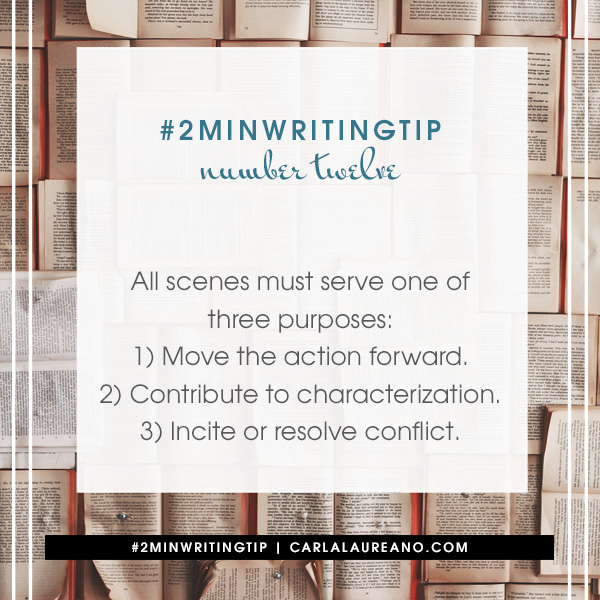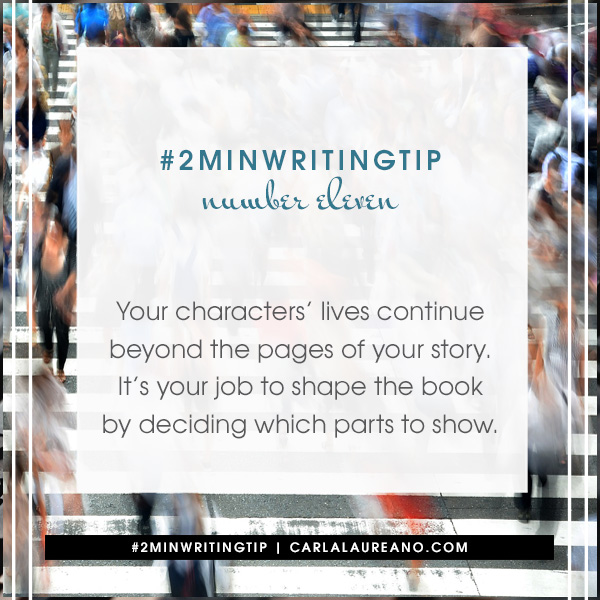Blog
#2MinBookReview – The Guernsey Literary and Potato Peel Pie Society
This week’s #2MinBookReview is The Guernsey Literary and Potato Peel Pie Society by Mary Ann Shaffer and Annie Barrows, which you all chose for me last week! I have to admit, though, this wasn’t my finest reading hour. Watch below to see why.
Tags: Guernsey Literary and Potato Peel Pie Society, literary fiction, World War II fiction
#2MinWritingTip – Be Selective

You’ve probably heard the famous writing advice “Kill your darlings” often attributed to William Faulker, Allen Ginsberg, and Stephen King (but probably really first said by Arthur Quiller-Couch). But what does that mean exactly? I’ve often heard it interpreted to mean that if you really love a piece of writing, it’s probably self-indulgent garbage. But I disagree. Sometimes those passages you love are special because they work incredibly well with the story.
So when should you really “kill your darlings?” There are three main situations in which a scene or passage needs to get kicked to the curb, whether you love it or not. All passages need to fulfill one of these three purposes.
It moves the action of the story forward.
Whether or not you’re writing plot-driven or character-driven stories (see this post for what I really think about that dichotomy), sometimes your plot needs to get from point A to point B. These “housekeeping” type passages can move the plot forward or relocate the characters to a different setting. The key is to keep them short and focused. If they are, they can stay.
It reveals something essential about the character.
A scene showing your gruff hero playing with his infant niece might not be strictly essential to the overall plot, but it tells us something important about the character and allows readers to relate to him better. Likewise, your story might have nothing to do with paintball, but showing us that your uptight, strictly-business heroine organizes a family paintball war every year shows a side of the character that your readers may need to find her likable. It’s okay to take detours with your story as long as it contributes to characterization.
It incites or resolve conflict.
Some passages may not be “housekeeping” or characterization, which leaves us with conflict. If the scene serves to introduce new problems for the characters that relate directly to their main goals or to resolve a conflict, it’s essential to the story and it belongs in the manuscript.
What if your scene is fabulous but doesn’t meet any of these three criteria? It’s time. Pull out the red pen or the delete key and kill that darling. Your manuscript and your readers will thank you for it.
Tags: editing, Kill your darlings, self-editing
#2MinWritingTip – The Secret Lives of Characters

I attended a workshop last year with a writer who is an excellent instructor and a brilliant marketer. I nodded along enthusiastically until he said, “Characters aren’t real people. They’re vehicles for conflict.”
While I understand what he was saying, one of the biggest mistakes that writers–especially beginning writers–can make is thinking of their characters as dolls they can move around their stories at whim. If you’re not careful, they begin to seem like props in a morality story, possessing no life of their own, but existing solely to make the author’s point.
I subscribe to the opposite theory of character development. When I envision my characters, they have vivid internal landscapes and lives that extend far beyond what’s actually shown on the page. It’s my job as an author to choose which parts of those lives to show in order to bring together a cohesive storyline. What I show on the page determines the prominent theme of the book.
We employ this kind of selective storytelling every day. I might say, “This was the worst day ever!” and then go on to talk about how my car wouldn’t start, my dishwasher overflowed, and I sat on my favorite sunglasses on the way home. However, I could also say about this same day, “This was the best day ever!” because I finished a big project, someone in front of me at Starbucks paid for my drink, and I found out my favorite niece was coming to visit. The day was exactly the same, but which incidents I choose to tell support the main assertion of my story.
So let your characters have their secret lives; it’s up to you which ones you want to share with the world.
[bctt tweet=”When I envision my characters, they have lives that extend far beyond what’s actually shown on the page. It’s your job as an author to choose which parts of those lives to show in order to bring together a cohesive storyline. #2MinWritingTip #writingtips”]
Tags: characterization, plot, theme
#2MinBookReview – Erotic Stories for Punjabi Widows by Balli Kaur Jaswal
This week’s#2MinBookReview is the buzzy Erotic Stories for Punjabi Widows. I realize this is kind of an unusual book for a Christian fiction author, but I’ve had so many people give it the side-eye lately, I thought I’d review it. Keep in mind that I tend to read pretty widely so conservative readers should use their best judgement.
Tags: Balli Kaur Jaswal, Erotic Stories for Punjabi Widows, Reese Witherspoon Book Club
